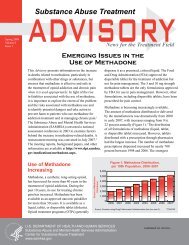TAP 21 - SAMHSA Store - Substance Abuse and Mental Health ...
TAP 21 - SAMHSA Store - Substance Abuse and Mental Health ...
TAP 21 - SAMHSA Store - Substance Abuse and Mental Health ...
You also want an ePaper? Increase the reach of your titles
YUMPU automatically turns print PDFs into web optimized ePapers that Google loves.
Addiction Counseling Competencies<br />
Cultural Competency<br />
Clients’ experiences of culture predate <strong>and</strong> influence their interaction with substance abuse<br />
treatment professionals. The majority of substance abuse treatment counselors are White,<br />
whereas nearly half of people who seek treatment are not White. 1 Regarding mental health<br />
services, clients who are not White express, at much higher rates than do White clients,<br />
the belief that they would have received better treatment if they were of another race. 2<br />
In addition to the references found in the bibliography for Transdisciplinary Foundation IV:<br />
Professional Readiness on pages 32 to 34, three Treatment Improvement Protocols (TIPs)<br />
provide information about cultural competency <strong>and</strong> substance abuse treatment. The forthcoming<br />
TIP Improving Cultural Competence in <strong>Substance</strong> <strong>Abuse</strong> Treatment is wholly devoted to<br />
the subject of culturally competent care. Information about the administrative challenges of<br />
preparing a program to provide culturally competent treatment can be found in chapter 4 of<br />
TIP 46, <strong>Substance</strong> <strong>Abuse</strong>: Administrative Issues in Outpatient Treatment, which includes an<br />
appendix listing resources for program assessment <strong>and</strong> cultural competency training. Chapter<br />
10 of TIP 47, <strong>Substance</strong> <strong>Abuse</strong>: Clinical Issues in Intensive Outpatient Treatment, addresses<br />
the clinical implications of culturally competent treatment <strong>and</strong> includes the following:<br />
uX<br />
u<br />
u<br />
u<br />
u<br />
u<br />
An introduction to current research supporting the need for individualized treatment<br />
that is sensitive to culture<br />
Principles in the delivery of culturally competent treatment services<br />
Topics of special concern, including foreign-born clients, women from other cultures,<br />
<strong>and</strong> religious considerations<br />
Clinical implications of culturally competent treatment<br />
Sketches of diverse client populations, including Hispanics/Latinos; African Americans;<br />
Native Americans; Asian Americans <strong>and</strong> Pacific Isl<strong>and</strong>ers; persons with HIV/AIDS; lesbian,<br />
gay, <strong>and</strong> bisexual populations; persons with physical <strong>and</strong> cognitive disabilities; rural<br />
populations; homeless populations; <strong>and</strong> older adults<br />
An appendix that lists resources on culturally competent treatment for various<br />
populations.<br />
1<br />
Mulvey, K.P., Hubbard, S., & Hayashi, S. (2003). A national study of the substance abuse treatment workforce.<br />
Journal of <strong>Substance</strong> <strong>Abuse</strong> Treatment, 24:51-57.<br />
2<br />
La Veist, T.A., Diala, C., & Jarrett, N.C. (2000). Social status <strong>and</strong> perceived discrimination: Who experiences<br />
discrimination in the health care system, how, <strong>and</strong> why? In C.J.R. Hogue, M.A. Hargraves, & K.S. Collins (Eds.)<br />
Minority <strong>Health</strong> in America. Baltimore: Johns Hopkins University Press, 194-208.<br />
162

















